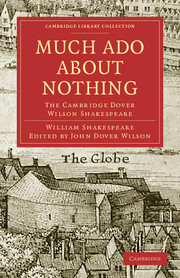THE STAGE-HISTORY
Published online by Cambridge University Press: 07 September 2010
Summary
The title-page of the Quarto of 1600, which is the first printed edition of Much Ado about Nothing, says that ‘it hath been sundrie times publikely acted by the right honourable, the Lord Chamberlaine his servants.’ It was one of the fourteen plays acted by the Lord Chamberlain's men at Court before the Princess Elizabeth and the Prince Palatine Elector during the festivities that celebrated their betrothal and wedding; and John Heminge, representing the Company, was paid by a warrant dated at Whitehall, May 20, 1613. It is easy to believe that a play so rich in ‘good acting parts’ was a favourite with the players, and so delightful a comedy a favourite with the public; but of Much Ado about Nothing on the public stage we hear no more in the whole of the seventeenth century.
A regulation of December 12, 1660, preserved in the Lord Chamberlain's records, set aside nine plays by Shakespeare as the special property of D'Avenant and the Duke's Company; and of these Much Ado about Nothing was one. These plays D'Avenant proposed ‘to reform and make fitt for the Company of Actors appointed under his direction and command.’ At his reform of this particular play we have already had a glance in the note on the stage-history of Measure for Measure, where we saw Pepys (February 18, 1662) enjoying at ‘the Opera’ (the theatre in Lincoln's Inn Fields) The Law against Lovers, a play which D'Avenant had written from material out of Measure for Measure and Much Ado about Nothing.
- Type
- Chapter
- Information
- Much Ado about NothingThe Cambridge Dover Wilson Shakespeare, pp. 159 - 164Publisher: Cambridge University PressPrint publication year: 2009First published in: 1923



